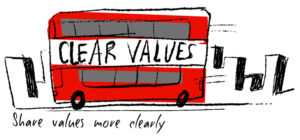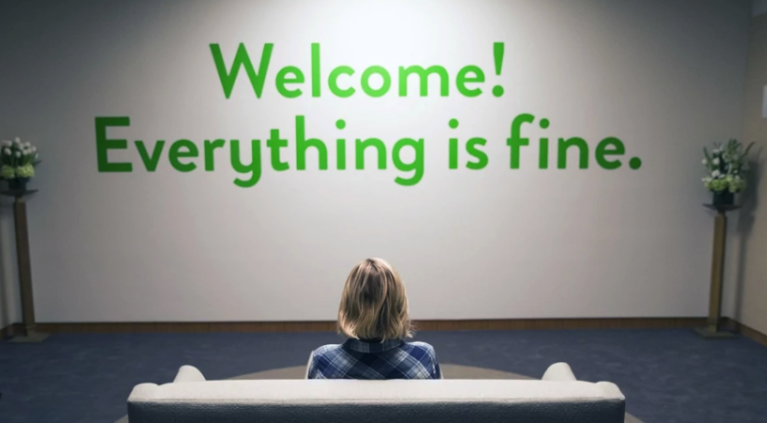How our values are driving our direction

Doteveryone exists to champion responsible technology – we want to see a world in which digital and emerging technologies can be a force for good – used to make life better for more people, more of the time. We’re aware though that the change we create is shaped by how we work and what we value so we’ve been spending some time defining what those values are.
Values that work well are ones that give everyone in an organisation a clear and shared direction they can live by. And as our CEO Rachel Coldicutt explains, values should also be the first step to guide any team or organisation when forced to make trade-off decisions.
Rachel explains that it is “easier to assume that your colleagues or your managers share the same values as you – that everyone is fundamentally a good person and that you all share the same definition of “good” – so we mostly don’t have these conversations.” As a small team, this is particularly easy to assume. It’s comforting to think: “everyone attends the weekly team meeting so they must know our values” or “didn’t we do that whole team away day?” or “we share cake on each other’s birthdays so we must share priorities.”
But what happens when we’re faced with making difficult decisions that are likely to have an impact on the organisation in ways we cannot foresee? A clearly articulated set of values will help.
To define Doteveryone’s values, we turned our own Responsible Leadership process on ourselves and, helpfully guided by our Associate, Alex Mecklenburg, landed on these values:
- We value people’s time and experience, and are impatient for change
- We turn complex ideas into accessible conversations
- We challenge the obvious and state the unsaid
- We respect the power of our voice and influence and try to use that to support and challenge others, as appropriate
- In turn, we welcome both support and challenge for our own work
- We are useful:
- We describe problems that others can’t see yet – in a timely way
- We understand how to make change, and create artefacts that helps others to do so.
It’s all very well and good having a set of values listed in your employee welcome pack or on the office wall but values only make sense if they are living, breathing things and help to make difficult decisions – whether large or small – easier to make. Here are some of the ways our values shape what we do:
Making difficult decisions easier to make
As Communications Manager, part of my role includes deciding whether a member of the team should accept an invitation to speak at or attend an event. There are so many interesting and relevant events out there, it would be impossible to attend them all. So it’s our emphasis on valuing people’s time and experience (as well as our own) that guides my decision here and then helps me articulate that decision to the rest of the team. I’ll ask:
- Is it the right audience for us? What value can we add to the audience?
- Does it have a reasonable agenda? What is the purpose of the event and would it help us deliver our mission?
- How would attending affect the delivery of other work? Have we been given enough notice?
- What is the time and financial investment required vs. the likelihood it will generate impact?
- Would it be worthwhile for personal development? Would we learn something new from attending?
- Have we been to a similar event in the past, was it worth it?
To help inform this final question, once someone has attended or spoken at an event, we log feedback on it. This then helps build our institutional knowledge about the value of various sector events and guide future decisions, regardless of who in the team is making them. This also empowers the whole team to make such decisions and gives the leadership team confidence in them because they know that they are close to the values we hold.
Helping our ideas travel further
Valuing people’s time also means fairly compensating people for their effort. As Lydia Nicholas, who led our Better Care Systems project writes, people do not owe you their time and energy to attend your events or advise you on your work. And it’s why our Better Work team made sure they didn’t overstep the mark in their interviews with Uber drivers.
And CEO, Rachel Coldicutt, in introducing Doteveryone’s Definition of Done explains; most of the people we try to help are “busy people with jobs to do, a list of overwhelming problems to solve, and too many emails to read.” This is why we work hard to make sure that our research findings and recommendations are understandable and memorable for people who don’t have the technical knowledge, but who do have short attention spans and never-ending reading lists.
“Life is too short for boring documents that don’t change anything” – Rachel Coldicutt
The Definition of Done also provides me personally with a useful framework to give feedback on the reports we publish. As the person responsible for getting people to hear about our work, I need to be sure that what we’re writing about will travel and reach the people we want to be putting our recommendations into practice. This means ensuring that what we write about is understandable and memorable for people who don’t necessarily have technical knowledge. It also means making sure that what we write about will make sense in a tweet and when shared out of context.
Dealing with the unexpected
We recently received a very pleasant surprise. The founder of PHP Hampshire, a Community Interest Company that is being wound up, got in touch to let us know they are transferring their residual assets to Doteveryone. The group, when they set up in 2014 to support the PHP community in Hampshire, liked the work of Go On UK, the digital skills charity which preceded Doteveryone and named us in their Articles of Association as their beneficiaries.
What to do with this unexpected injection of cash? In the spirit of ‘valuing the power of our voice and influence,’ we’ve decided to use it to fund another round of our Fairer Tech Events grants. The grants are for up to £500 and aim to help those who are running tech events make it easier for people who are often excluded to take part. Follow us on Twitter and sign up to our mailing list to find out as soon as applications open.
Driving us to keep doing better
We love praise. Who doesn’t? And we love it when people and organisations share our work because they believe in what we’re trying to achieve and want to help spread the word.
But we also want to be challenged. There are only 14 of us, although we often collaborate and ask for expert feedback via roundtables, open calls for evidence (we currently have one open calling for expertise to help us better understand the current landscape for digital rights and redress in the UK), and our newly announced Advisory Council.
Challenge also helps us learn and do better and also realise when we perhaps shouldn’t be doing something. Last summer, for example, we launched a digital public health campaign called Be a Better Internetter as an experiment – to find out whether it’s possible to find simple and positive ways to show people how to make their tech work better for them. Director of Policy, Catherine Miller, writes here about the lessons we learnt – many of which emerged from some friendly criticism.
Doteveryone is still a young organisation but as we develop, these values really help to chart the way ahead. As champions of responsible technology, we need to practice what we preach – a clear articulation of values that you can fall back on when the unexpected happens is a big part of that.
So in the spirit of welcoming support and challenge, let us know what you think of our values and whether they can help us achieve our mission to make responsible technology the new normal.
